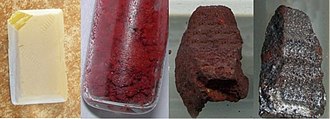Posporo (elemento)
Ang posporo (Ingles: phosphorus) ay isang elementong kimikal sa talahanayang peryodiko na sinasagisag ng simbolong P at nagtataglay ng atomikong bilang 15.
 | |||||||||||||||
| Phosphorus | |||||||||||||||
|---|---|---|---|---|---|---|---|---|---|---|---|---|---|---|---|
| Bigkas | /ˈfɒsfərəs/ | ||||||||||||||
| Allotropes | puti, pula, biyoleta, itim at iba pa (mga alotropo ng posporo) | ||||||||||||||
| Appearance | Colourless, waxy white, yellow, scarlet, red, violet, black | ||||||||||||||
| Standard atomic weight Ar°(P) | |||||||||||||||
| Abundance | |||||||||||||||
| in the Earth's crust | 5.2 (taking silicon as 100) | ||||||||||||||
| Phosphorus sa talahanayang peryodiko | |||||||||||||||
| |||||||||||||||
| Group | 15 | ||||||||||||||
| Period | 3 | ||||||||||||||
| Block | p-block | ||||||||||||||
| Electron configuration | [Ne] 3s2 3p3 | ||||||||||||||
| Electrons per shell | 2, 8, 5 | ||||||||||||||
| Physical properties | |||||||||||||||
| Phase at STP | solid | ||||||||||||||
| Density (near r.t.) | white: 1.823 g·cm−3 red: ≈ 2.2–2.34 g·cm−3 violet: 2.36 g·cm−3 black: 2.69 g/cm3 | ||||||||||||||
| Heat of fusion | white: 0.66 kJ/mol | ||||||||||||||
| Heat of vaporisation | white: 51.9 kJ/mol | ||||||||||||||
| Molar heat capacity | white: 23.824 J/(mol·K) | ||||||||||||||
Vapour pressure (white)
| |||||||||||||||
Vapour pressure (red, b.p. 431 °C)
| |||||||||||||||
| Atomic properties | |||||||||||||||
| Oxidation states | −3, −2, −1, 0,[3] +1,[4] +2, +3, +4, +5 (isang katamtamang asidikong oksido) | ||||||||||||||
| Electronegativity | Pauling scale: 2.19 | ||||||||||||||
| Ionisation energies |
| ||||||||||||||
| Covalent radius | 107±3 pm | ||||||||||||||
| Van der Waals radius | 180 pm | ||||||||||||||
| Other properties | |||||||||||||||
| Natural occurrence | primordiyal | ||||||||||||||
| Crystal structure | body-centred cubic (bcc) | ||||||||||||||
| Thermal conductivity | white: 0.236 W/(m⋅K) black: 12.1 W/(m⋅K) | ||||||||||||||
| Magnetic ordering | white, red, violet, black: diamagnetic[5] | ||||||||||||||
| Molar magnetic susceptibility | −20.8·10−6 cm3/mol (293 K)[6] | ||||||||||||||
| Bulk modulus | white: 5 GPa red: 11 GPa | ||||||||||||||
| CAS Number | 7723-14-0 (red) 12185-10-3 (white) | ||||||||||||||
| History | |||||||||||||||
| Discovery | Hennig Brand (1669) | ||||||||||||||
| Recognised as an element by | Antoine Lavoisier[7] (1777) | ||||||||||||||
| Isotopes of phosphorus | |||||||||||||||
| Template:infobox phosphorus isotopes does not exist | |||||||||||||||
Isang multivalent na hindi metal na kabilang sa grupo ng nitroheno, ang posporo ay kadalasang matatagpuan sa mga di-organikong batong phosphate. Ang Elementong posporo ay may dalawang uring laganap - puting posporo at pulang posporo. Bagamat ang ibig-sanihin ng salitang "phosphorescence" ay lumiwanag matapos ang pag-ilaw, mula sa salitang posporo, ang ilaw ng posporo ay nagmumula sa pag-o-oksihena ng puti-(ngunit di pula)-ng posporo at dapat tinatawag na chemiluminescence.
Dahil sa mataas nitong reaktibidad, ang posporo ay hindi kailanman nahahanap bilang malayang elemento sa kalikasan ng Daigdig. Ang kaunaunahang uri ng posporo (puting posporo, noong 1669) ay naglabas ng mahinang ilaw matapos matamaan ng oksiheno— kaya't binansagan itong (mula sa mitolohiyang Griyego) Φωσφόρος, na ang ibig-sabihin ay "tagadala ng liwanag" (wikang Latin: Lucifer), na sinasagisag ang "Tala ng Umaga", ang planetang Venus.
Ang posporo ay bahagi ng DNA, RNA, ATP, pati na ang lipidong-posporo na bahagi ng mga cell membranes. Ito ay isang esensyal na elemento para sa lahat ng buhay na cell. Karaniwan din itong makikita sa mga pataba, pulbura, kremang pansipilyo, pestecide, mga sabon panglaba, at siyempre, sa mga posporo mismo.
Mga sanggunian
baguhin- ↑ "Standard Atomic Weights: Phosphorus" (sa wikang Ingles). CIAAW. 2013.
{{cite web}}: CS1 maint: date auto-translated (link) - ↑ Prohaska, Thomas; Irrgeher, Johanna; Benefield, Jacqueline; Böhlke, John K.; Chesson, Lesley A.; Coplen, Tyler B.; Ding, Tiping; Dunn, Philip J. H.; Gröning, Manfred; Holden, Norman E.; Meijer, Harro A. J. (2022-05-04). "Standard atomic weights of the elements 2021 (IUPAC Technical Report)". Pure and Applied Chemistry (sa wikang Ingles). doi:10.1515/pac-2019-0603. ISSN 1365-3075.
{{cite journal}}: CS1 maint: date auto-translated (link) - ↑ Wang, Yuzhong; Xie, Yaoming; Wei, Pingrong; King, R. Bruce; Schaefer, Iii; Schleyer, Paul v. R.; Robinson, Gregory H. (2008). "Carbene-Stabilized Diphosphorus". Journal of the American Chemical Society (sa wikang Ingles). 130 (45): 14970–1. doi:10.1021/ja807828t. PMID 18937460.
{{cite journal}}: CS1 maint: date auto-translated (link) - ↑ Ellis, Bobby D.; MacDonald, Charles L. B. (2006). "Phosphorus(I) Iodide: A Versatile Metathesis Reagent for the Synthesis of Low Oxidation State Phosphorus Compounds". Inorganic Chemistry (sa wikang Ingles). 45 (17): 6864–74. doi:10.1021/ic060186o. PMID 16903744.
{{cite journal}}: CS1 maint: date auto-translated (link) - ↑ Lide, D. R., pat. (2005). "Magnetic susceptibility of the elements and inorganic compounds". CRC Handbook of Chemistry and Physics (PDF) (ika-86th (na) edisyon). Boca Raton (FL): CRC Press. ISBN 0-8493-0486-5. Inarkibo mula sa orihinal noong 2011-03-03. Nakuha noong 2018-09-26.
{{cite book}}: CS1 maint: bot: original URL status unknown (link) CS1 maint: date auto-translated (link) - ↑ Weast, Robert (1984). CRC, Handbook of Chemistry and Physics. Boca Raton, Florida: Chemical Rubber Company Publishing. pp. E110. ISBN 0-8493-0464-4.
{{cite book}}: CS1 maint: date auto-translated (link) - ↑ cf. "Memoir on Combustion in General" Mémoires de l'Académie Royale des Sciences 1777, 592–600. from Henry Marshall Leicester and Herbert S. Klickstein, A Source Book in Chemistry 1400–1900 (New York: McGraw Hill, 1952)
- ↑ Ellis, Bobby D.; MacDonald, Charles L. B. (2006). "Phosphorus(I) Iodide: A Versatile Metathesis Reagent for the Synthesis of Low Oxidation State Phosphorus Compounds". Inorganic Chemistry. 45 (17): 6864–74. doi:10.1021/ic060186o. PMID 16903744.
{{cite journal}}: CS1 maint: date auto-translated (link)

